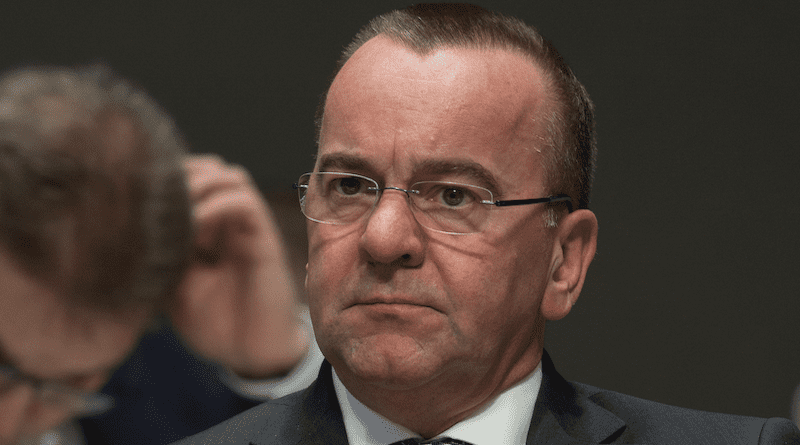Germany Picks ‘Dark Horse’ Pistorius As Defence Minister
By EurActiv
By Oliver Noyan
(EurActiv) — Boris Pistorius, Lower Saxony’s Social-Democrat interior minister, was appointed as Germany’s new defence minister on Tuesday (17 January), with his first test – Berlin debating the supply of heavy battle tanks to Ukraine – looming later this week.
Defence Minister Christine Lambrecht resigned on Monday as the coalition government faced rising pressure to allow its allies to send German-made Leopard tanks to Ukraine, at the start of what is likely to be a pivotal week for Western plans to further arm Ukraine.
Lambrecht has also been criticised over reform delays of the Bundeswehr, which Chancellor Olaf Scholz has declared a priority, with her reform proposal being said to lack substance.
“Pistorius is an extremely experienced politician who has administrative experience, has been dealing with security policy for years and, with his competence, assertiveness and big heart, is exactly the right person to lead the Bundeswehr through this turning point in time,” Scholz said on Tuesday when announcing the appointment.
‘Surprising choice’
However, the choice of Pistorius, who is relatively unknown in Germany, came as a surprise to many in Berlin’s government circles.
Earlier, the names of several other high-ranking Scholz confidants had been circulated: next to Chancellery Minister Wolfgang Schmidt and leader of the Social Democrats, Lars Klingbeil, incumbent Labour Minister Hubertus Heil and Parliamentary Commissioner for the Armed Forces Eva Högl had been reportedly considered.
Since 2013, Pistorius has been dealing with internal security, cybercrime, migration, and sports in the SPD-led state government in Lower Saxony, with experience of running a ministry.
Most notably, he clashed with then SPD party leader Saskia Esken over racism accusations in Germany’s security forces, defending them from what he called “unjustified general suspicion”.
On the federal level, he only gained visibility after he ran for SPD chairmanship in 2019, which ultimately proved unsuccessful.
Troubled waters ahead
Pistorius is considered to be a hardliner when it comes to domestic security policy and made headlines over his crackdown on Islamic fundamentalists in his state. However, little is known about his position when it comes to defence since he has had little prior experience in the area.
“Pistorius is a surprising choice,” chairwoman of the defence committee in the Bundestag, Marie-Agnes Strack-Zimmermann (FDP), told t-online.
“He will not get a grace period in view of the dramatic international situation and the state of the Bundeswehr,” she added.
Germany is facing a crucial moment in its defence policy. In response to Russia’s war of aggression, Scholz has announced a paradigm shift in German security policy, dubbed Zeitenwende, which entails a €100 billion budget to bring the long-neglected Bundeswehr back on track.
However, the defence ministry is stalling more fundamental reforms of the German armed forces. The opposition has criticised Scholz’s personnel choice, saying Pistorius might not live up to the current task due to his lack of experience.
The vice-chairman of the conservative CDU, Johann Wadephul, told dpa that “the Chancellor is showing that he is not taking his own Zeitenwende seriously”.
“Once again, expertise and experience with the Bundeswehr do not play a role,” he added.
The discussion on whether or not to supply battle tanks to Ukraine will be the first key test when the Ukraine Defense Contact Group meets in Ramstein on 20 February.
Scholz has been putting the brakes on the issue for weeks, despite rising pressure from allies on Berlin to consent to the delivery of heavy battle tanks to Kyiv. He told a press conference last Friday only that all decisions will be made exclusively in coordination “with our friends and allies”.
US Secretary of Defense Lloyd Austin is expected in Berlin on Thursday to discuss increased military support for Ukraine, followed by the Ukraine Defense Contact Group meeting in Ramstein meeting on Friday.
Lambrecht’s track record
Lambrecht came under fire as defence minister before she took office in December 2021, for having no experience in the defence sector.
One month into office, she made headlines when she refused to deliver weapons to Ukraine and instead offered to send 5,000 helmets – which Kyiv’s major Wladimir Klitschko called “a joke” at the time.
The incident was only the first of many faux pas plaguing the German defence ministry. Only a few months later, it became public that she had taken her son with her on a trip in a Bundeswehr helicopter, which sent her approval ratings plummeting.
According to a poll released earlier this month, as many as 77% of Germans wanted her to resign, the lowest approval for a defence minister ever measured.
Lambrecht blamed her bad public image primarily on the media.
“The months-long media focus on my person hardly allows for factual reporting and discussion about the soldiers, the Bundeswehr, and security policy decisions in the interest of the citizens of Germany,” Lambrecht said in her resignation statement.

